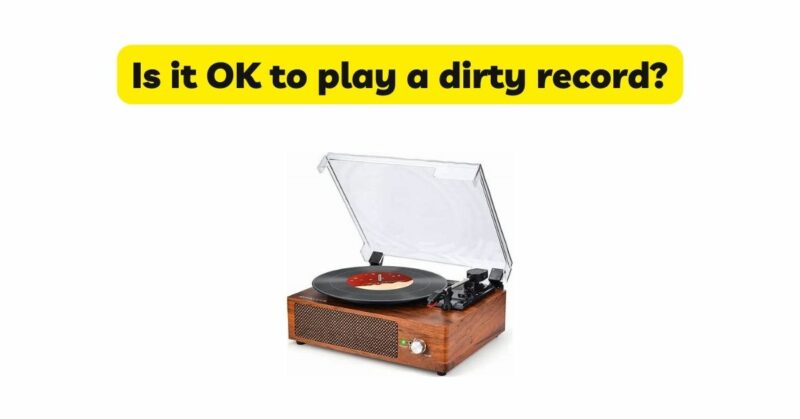Vinyl records have made a significant comeback in recent years, captivating music enthusiasts with their unique sound and tactile experience. However, the cleanliness of records plays a crucial role in preserving their quality and ensuring an optimal listening experience. This leads us to the question: Is it okay to play a dirty record? In this article, we will delve into the implications and risks of neglecting record cleaning, exploring the potential consequences for both the records themselves and the overall sound quality.
Impact on Sound Quality: Playing a dirty record can have a significant impact on sound quality. Dust, dirt, and debris on the record surface can cause audible pops, crackles, and background noise. The stylus encounters these particles as it tracks along the grooves, resulting in distortions and a loss of clarity in the audio reproduction. Neglecting record cleaning can diminish the full potential of the music, preventing you from experiencing the true depth and richness of your vinyl collection.
Risk of Stylus Damage: One of the most critical aspects of record care is safeguarding the stylus, also known as the needle. Dust and debris on the record surface can be abrasive, leading to unnecessary wear and potential damage to the stylus. A dirty record increases the likelihood of the stylus encountering particles that can cause scratches or excessive friction, which may result in permanent damage or reduced performance. Neglecting record cleaning can lead to costly stylus replacements or even damage to your turntable’s cartridge.
Preservation of the Vinyl Record: Vinyl records are delicate and require proper maintenance to ensure their longevity. Neglecting record cleaning allows dust and debris to accumulate, potentially embedding them into the grooves over time. This buildup can be difficult to remove and may permanently affect the record’s sound quality. By playing dirty records, you risk compromising the physical condition of the vinyl, reducing its lifespan, and diminishing the value of your collection.
Amplification of Existing Imperfections: A dirty record can amplify any pre-existing imperfections or damage on its surface. Scratches, scuffs, or warps become more noticeable when combined with the presence of dust and debris. These imperfections can disrupt the smooth tracking of the stylus, leading to skips, jumps, or repetitive loops in the playback. Playing a dirty record accentuates these issues and detracts from the overall listening experience.
Negative Impact on the Turntable: In addition to the risks posed to the record and stylus, neglecting record cleaning can have adverse effects on your turntable itself. Dust and debris can accumulate on the platter and in the motor or belt mechanism, affecting the turntable’s overall performance. Over time, this buildup can hinder the turntable’s rotational stability and contribute to speed fluctuations or other mechanical issues. Regular record cleaning not only benefits the records but also helps maintain the optimal functioning of your turntable.
Cleaning Methods and Best Practices: To ensure proper record cleaning, there are various methods and best practices to consider. Dry brushing with a carbon fiber brush or an anti-static brush is a simple and effective way to remove loose particles from the record surface. Additionally, using record cleaning solutions and specialized brushes or cleaning machines can provide more thorough and deep cleaning. It’s important to handle records with care, use gentle pressure, follow the grooves, and allow adequate drying time if using wet cleaning methods. By incorporating these practices, you can effectively clean your records and mitigate the risks associated with neglecting record cleaning.
Frequency of Cleaning: The frequency of record cleaning depends on several factors, including the environmental conditions, handling practices, and the record’s condition. It’s recommended to clean records before their initial playback and regularly thereafter. Routine cleaning helps prevent the accumulation of dust and debris, ensuring better sound quality and extending the lifespan of your records. Visual inspection is a useful indicator of when a record requires cleaning. If you observe visible dirt or debris, it’s crucial to clean the record before playing it.
Conclusion: Neglecting record cleaning can have detrimental effects on the sound quality, longevity of your vinyl collection, and the performance of your turntable. Dust, dirt, and debris can compromise sound reproduction, damage the stylus, and exacerbate existing imperfections on the record surface. By recognizing the importance of record cleaning and incorporating appropriate cleaning methods and practices into your routine, you can preserve the integrity of your records and enjoy the full potential of the vinyl playback experience. Embrace the responsibility of record care, and let the music on your clean records come alive with every spin on your turntable.


